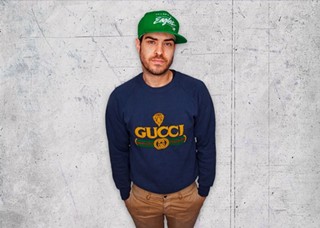Once upon a time, when radio mattered, the DJ was king. The guy (or gal) who played the records had a distinctive voice — both literally and figuratively — and could alter your mood with the flick of a switch and turn of a table. The best DJs always knew how to read their audience.
It's that way in today's dance clubs, as the DJ — it originally stood for "disc jockey," children — absolutely controls the pulse of the room.
The 2013 Savannah Urban Arts Festival, April 21-28, is bringing in Jeffrey Tonnesen as its featured artist. He's one of New York's hottest club DJs, with weekly residencies in three smokin' clubs, and he travels the world — Italy, Japan, the South of France — at the request of fashion giants who want his magic touch at their runway shows. (ACNE, DVF, Rag & Bone and Prada, for starters. He's also spun magic for the Veuve Clicquot Polo Classic and the Bienalle in Venice).
Tonnesen is what's known as a "Celebrity DJ."
The AWOL- and City of Savannah-sponsored Urban Arts Festival, now in its fifth year, focuses on (but is not limited to) hip hop and other urban styles of music and art. It's accomplished through live performances, workshops, exhibits, panel discussions and more (see this year's schedule on Page 29).
In 2013, the SUAF theme is "The Year of the DJ."
Like all previous featured artists, Tonnesen will give a full performance, and conduct a mix 'n flow workshop with area youth at the AWOL office center.
OK, you've got one of these big fashion gigs in Europe or wherever. Do they tell you the sort of music they want you to play?
Jeffrey Tonnesen: It really depends on the client. Definitely one of the more memorable experiences I've had was the Prada show in Tokyo. I'd worked with them before so I knew they were going to give me some kind of inspiration leading up to it. My prep time for something, even if it's bizarre and specific, normally is about 24 hours. If it's really weird. And it turned out this show was really weird — it was all about rockabilly and Tokyo at the same time. But they didn't want the playlist to be kitsch. They didn't want me to play all kinds of rockabilly music. So I had to come up with an interesting perspective on those topics.
So in 24 hours, do you go to all the record stores in Tokyo to see what's there?
Jeffrey Tonnesen: Record shopping for professional DJs has become pretty much obsolete. Everything's available on the Internet. It's a much more efficient process, it's a much more cohesive and comprehensive process. Record shopping is something that I do for fun. That's a hobby.
Doesn't that ruin the aesthetics of vinyl — the turntables, the scratching, the mixing?
Jeffrey Tonnesen: The current format of the way I perform live — it's what everyone uses — is a program called Serato. It connects our laptop to the turntables. So we're still using the turntables; we're still physically performing a lot of the motions that we would if we were using records. I use the turntables for scratching and mixing — I don't do it because it reminds me of the good old days.
There's the generation of DJs that used to lug crates of records to a gig. You'd throw them in the back of a cab, or get on a plane with them. And then there's a new generation of DJs that have never touched a real record. Truthfully, I'm somewhere in between that generation. I've played gigs where I've brought a couple hundred records and a few CDs, and worked off of that. And currently, for most everything that I do, I just use an all-electronic format.
Serato is designed for the people who were used to carrying vinyl, and to mixing vinyl, so that they can use their mp3s but still use the technique that they'd been working for the last few years.
Any gig, public or private ... how much of it is pre-planned in your mind?
Jeffrey Tonnesen: Nothing I do is ever all planned. I have a few routines, a few groups of songs that I will mix through quickly, that I think go well together. They're sets of transitions that I've sort of rehearsed. That I know work well. But unless it's a club that I've played more than 20 times, I really don't have any kind of formula pre-planned.
One of my longest residencies was at Avenue, on Wednesdays here in New York. I did the math, and it turns out I played that room almost 200 times. I was running the show like a train. I knew that I was on schedule, and I knew that at 1:45 I needed to be at a certain energy, at 2 I needed to be at a certain energy, at 2:15 I needed to be at a certain energy ... but the song that I was using to get that energy was never pre-planned. It's formulaic because of the arc of the energy I want for the night, but it can't be formulaic in terms of the exact songs. Because if you play the wrong song at the wrong time, you lose the room.
How did you get started doing this?
Jeffrey Tonnesen: I was a party kid on the Lower East Side. I moved to New York in 1999 to go to school, and I was a rock kid. I was a hipster, kind of a mod, and I used to just basically snort coke and drink booze. This is when Interpol, the Strokes and the Yeah Yeah Yeahs would play in little bars. I would hang out with them. There was a real scene in town.
This was during the time of Limewire and Napster. And DJing and technology go hand in hand. When I started, this was the first time that you could just think of a song that you remembered, and you could then very quickly get an mp3 version of that file.
So I would compile the books of CDs that I had, this short stack of records that I had — I actually borrowed some records from my girlfriend — and would burn a couple of mix CDs. I would go to these rock bars, get wasted and play whatever Clash tunes or Buzzcock tunes, or whatever I thought was interesting at the time. And it ended up working out for me.
I was just partying and DJing, and it got to the point where I just really wasn't able to be employed any other way. Before I knew it, I was working five nights a week and just grinding it. That was 2006, 2007, and I've never worked less than 15-20 nights a month.
Do you consider yourself an artist, or just a guy who's good at what he does?
Jeffrey Tonnesen: In my work, I just consider myself someone that's really good at what he does. I don't over-aggrandize what I do. I don't think I'm an artist; I'm very talented. I'm a sociology major, I study sociology, and I don't know if that has something to do with it, or if it has more to do with the fact that I just really liked to dance when I was a kid. It's one of these two things.
But I have a great ability to sit in a room with people, or sit in front of a person, or stand on a stage in front of 3,500 people — I can look at them collectively and decide which songs they all want to hear.
I would rather you call me an artist than me call me an artist. This is a job, and I want to do a great job. I go to a nightclub and I try to make sure you have the best time possible. I'm there for you.





























